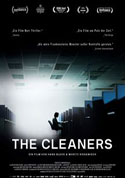

Opening 17 May 2018
Directed by:
Hans Block, Moritz Riesewieck
Writing credits:
Hans Block, Moritz Riesewieck
Directors Hans Block and Moritz Reisewieck debut their documentary The Cleaners to address a hot topic of conversation of whether or not Silicon Valley should be a gatekeeper of our freedom of speech using the online platform. Social media has its stage for expression but opens the door for radical social and political opinions. Some of the controversy Block and Reisewieck explore have to do with what makes an image art or propaganda, as well as to define the scope of journalism.
The Cleaners are people who are hired by big online companies to scan the internet for inappropriate, disturbing and offensive content that appear on commercial and personal websites. They are Internet gatekeepers of indecency.
The Cleaners are officially referred to as Content Moderators. Their job is to clean-up online “dirt.” Indecent (dirt) images and content uploaded from numerous sites are sought after and when discovered they are immediately taken off the internet. The moderators view endless hours of horrific images from around the world ranging from hard core sexual behavior, crime, ISIS beheadings and atrocities, war-zone photography, brutality, killings and more. After viewing these types of images they click a button to either delete or ignore. A single “cleaner” can view thousands of images a night.
This type of job has been a highly secretive aspect of Internet clean-up until now, to the extent that those contracted for these jobs are not allowed to quit. As one can imagine, this creates a growing amount of controversy in reference to the lasting psychological impact--the health and well-being of The Cleaners.
Block and Reisewieck showcase testimonials of a few “digital scavengers” and a few, from the group of thousands of people around the world, of those outsourced by Silicon Valley to take down inappropriate content off the internet, are stories to be reckoned. Their job to control online censorship has dramatically affected their lives. And at what cost? (Karen Pecota)